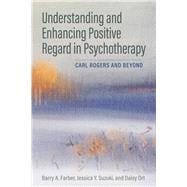The therapeutic relationship, more than any particular technique or intervention, is the key to therapeutic success. Positive regard is a crucial component of that relationship. This book reconsiders the role of positive regard in contemporary psychotherapies.
Positive regard, along with the therapist's empathy and genuineness, is one of Carl Rogers' three "necessary and sufficient" conditions for therapeutic change. However, positive regard is the least well-researched and most misunderstood of the three conditions. It has long been conceived as a potential ingredient in the formation and development of an effective therapeutic relationship, but many therapists in recent decades have considered positive regard a dubious ingredient, too oblivious to human frailty and malevolence, and too susceptible to a therapist's potential for collusion with patients' defenses and resistance to change.
Written for a variety of psychotherapists, this book offers an investigation into the efficacy of positive regard by examining its history, evolution, misperceptions, criticisms, and value. The authors argue for a broader acceptance of the role of positive regard across diverse patients and therapies.








